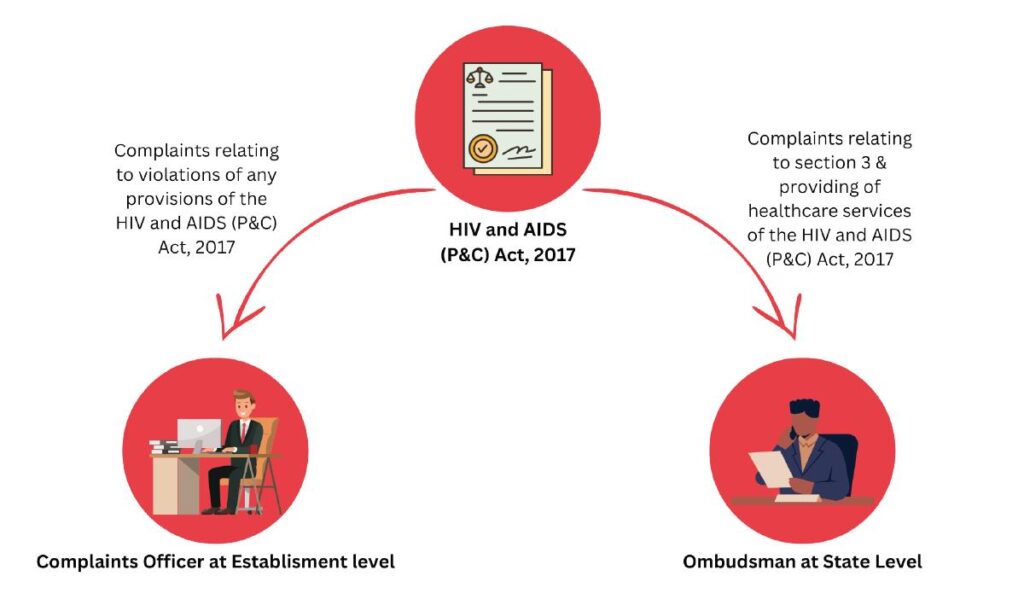Your Path to Justice : Redressal Mechanisms under the HIV and AIDS (Prevention and Control) Act, 2017 EXPLAINED!
Aayushi
Queer-Trans individuals, often marginalized and stigmatized, face a heightened risk of HIV infection due to systemic discrimination and social inequalities. This vulnerability is compounded by the pervasive stigma associated with both HIV and queer identities, which can lead to exclusion, violence, and limited access to healthcare.
According to the UNAIDS, 2023 Global AIDS Update, up to 40% of members from the community are living with HIV, highlighting the disproportionate impact of the epidemic on this community. Furthermore, a significant number of them report avoiding HIV testing due to fear of stigma and discrimination highlighting significant prejudice faced by the queer-trans* communities
Keeping this in mind, The HIV/AIDS (Prevention and Control) Act of 2017 represents a significant stride towards protecting the rights of people living with HIV (PLHIV) in India and ensuring equitable access to care, support, and treatment. The act extends its provisions to a broad spectrum of individuals, including those who have lived with or cared for a PLHIV. By recognizing the diverse experiences and challenges faced by this population, the law aims to mitigate the impact of HIV-related stigma and discrimination.
To effectively challenge discrimination, advocate for one’s needs, and exercise one’s rights, it’s crucial to understand and utilize available redressal mechanisms, which is the aim of this article.
But before going into the grievance redressal mechanisms, first a brief overview of the rights covered in the act :
- Informed consent is mandatory before undergoing any HIV test, treatment, or research. As per Section 5 and 6 of the act.HIV testing must be accompanied by counselling both before and after a test.
- Section 3 mandates that PLHIV have the right to access health services, including prevention, counseling, testing, and treatment services. This includes the right to receive Anti-Retroviral Therapy (ART) and opportunistic infection management t
- An individual’s HIV status is confidential. Section 8, 9 and 11 mandates that information about a person’s HIV status and data related to it cannot be disclosed without their explicit consent – except by the order of court. That is a friend or co-worker or acquaintance cannot disclose one’sHIV status to anyone without explicit consent.
- Section 3 and 4 of the act forbids all acts of discrimination in employment, healthcare, education, and other services, applicable to both public and private sector ensuring that PLHIV are not subjected to unfair treatment, exclusion, or stigmatization. If this is breached there’s a penalty specified in the Act that is imprisonment from three months to two years and/or fine of upto 1 lakh.
- Section 3 and 29 of the Act mandate that PLHIV have the right to reside in shared households. It is illegal to evict individuals from their homes solely because of their HIV status.
For more you can see HIV/AIDS (Prevention and Control) Act.
The Act’s strengths also lie in establishing a robust grievance redressal mechanism to safeguard rights of PLHIV. This includes the appointment of State-level Ombudsmen and establishment-level Complaints Officers, ensuring prompt resolution of grievances and complaints. A detailed overview of this mechanism will be provided in the following sections.
Who can register a complaint?
Any person may approach and register the complaint in case of a violation under the HIV and AIDS (Prevention & Control) Act, 2017.

One can also approach a civil court for any violation of the Act.
The Act mandates strict confidentiality for all HIV-related information, including for the Ombudsman, Complaints Officers, and anyone else maintaining complaint records. All individuals handling such information are legally obligated to protect sensitive data.
Brief overview of State Ombudsman
As per section 23 and 25 of the Act, every State govts and Union Territory govt must appoint one or more Ombudsman and set rules for their duties and handling complaints/violations of the HIV Act.
A state wise list of Ombudsman and their contact details can be found here.
Complains regarding discrimination under Section 3 and issues with healthcare services under the HIV and AIDS Act can be filed with the State Ombudsman.
The rules regarding the Ombudsman vary by state and union territory. To find the specific rules for your region, you’ll need to visit the website of the respective SACS (State AIDS Control Society) and look for relevant notifications.
For example
- For Maharashtra, all the details can be found on Maharashtra State Aids Control Society website and the notification.
- For Delhi, all the details can be found on Delhi State AIDS Control Society website and the notification.
The Ombudsman has to issue a written decision within 30 days after hearing both sides. In case of medical emergencies for HIV-positive individuals, the Ombudsman has to issue a decision within 24 hours.
The act also specifies penalties for not following the order of Ombudsman i.e. they could face a fine of up to ₹10,000. And if the non-compliance persists, there’s an additional daily penalty of up to ₹5,000.
Complaint Registration Process with Ombudsman :
One can file a complaint with the State Ombudsman, starting from when they first notice the issue. For most states this time period is typically within three months of noticing the issue. However, specific timelines may vary by state, so it’s best to check the respective State rules. In certain cases, the Ombudsman can extend this deadline by three months if there’s a valid reason for the delay.
Complaints with the Ombudsman can be filed in person, by mail, phone, or online.
One has to submit complaints using the form in Annexure I of specific State Policy for HIV.
The form typically requires these details :
- Name
- Mobile no.
- Email id
- Address
- Date of incident
- Place of incident
- Person/institution responsible for the incident
- Description of incident
But it’s best to check the respective state forms. For instance
- For Maharashtra, the form can be found here or online too.
- for Madhya Pradhesh, the form can be found here
If there’s any difficulty in writing, the Ombudsman will assist in documenting the complaint. In a medical emergency, the State Ombudsman or their assistant may visit the complainant’s location or another suitable place to help document the complaint too!
Brief overview of Complaints Officer
As per section 23 and 25 of the Act, any establishment with 100 or more employees, officers, directors, trustees, or managers and any healthcare facility with 20 or more people must appoint a Complaints Officer.
Complaints regarding any violation of the HIV and AIDS Act can be filed with the designated Complaints Officer (CO) at the establishment or healthcare facility.
There’s a state wise list of Complaints officers too here.
The process of registering complaints and the duties of the CO are similar to those of the Ombudsman. This includes a similar timeline of registering complaints within 3 months of becoming aware of the violation which can be extended, complaint forms format with reasonable assistance of CO and allowing for complaints to be in person, or via post/telephone/ email.
Regarding decision-making timelines, first the CO has to provide an acknowledgment of the complaint in electronic form. Then, the CO must issue a written decision within 7 working days. In urgent health emergency cases or a complaint regarding discrimination or access in healthcare establishments, the decision must be made the same day.
If dissatisfied with the Complaints Officer’s decision, one can pursue further legal action, such as filing a complaint with the Ombudsman or taking the matter to court.
Complaint Officers are to comply with the data protection measures in accordance with section 11 of the Act and guidelines on confidentiality of data of protected persons under section 5.3 of the HIV and AIDS Policy for Establishments.
It’s important to note that one can file a complaint with the State Ombudsman, regardless of whether one’s workplace or healthcare facility has a designated Complaints Officer. One has the option to file a complaint directly with the State Ombudsman, even if one’s workplace has a Complaints Officer.
In addition to these two measures, one also has the right to seek legal recourse by filing a civil lawsuit for any violations of the Act where one can apply for confidentiality too!
A criminal complaint can be filed in three specific situations:
- Hate speech related to HIV/AIDS
- Violation of confidentiality in legal proceedings related to HIV/AIDS
- Non-compliance with an Ombudsman’s order.
———————————–
HIV-related stigma and discrimination deeply impact the health, well-being, and quality of life for LGBTQ+ individuals living with HIV. While the HIV/AIDS (Prevention and Control) Act of 2017 is a significant step forward in protecting the rights of PLHIV, it’s crucial to be aware of avenues to seek justice.
While the process of seeking redressal can be demanding and time-consuming, we hope this information empowers you to take action and protect your rights. Remember, you are not alone in this fight.
Note: We do not endorse or guarantee the accuracy, completeness, or usefulness of any information provided. Consult your healthcare provider before making any healthcare decisions or changes to your treatment based on information obtained from this platform. In case of a medical emergency or urgent situation, please seek immediate medical attention or contact your local emergency services.
